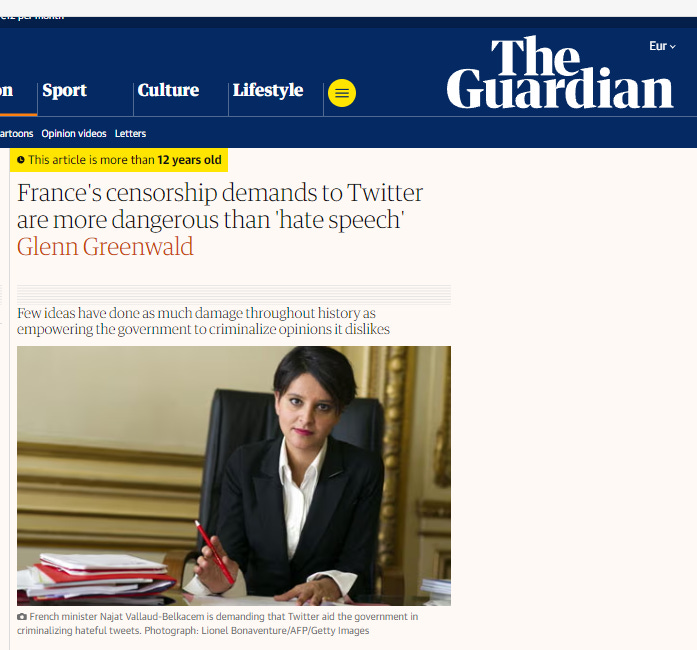Death By X
In France, reactions to the CEO of Meta/Facebook reversing his stance on fact-checking and to Elon Musk's raving on X, are pathetic.
Ever since Mark Zuckerberg began emulating Elon Musk by announcing a shift in content moderation policy from tightly controlled fact-checking to allowing everyone to contribute through community notes, the French elites have been left stunned, much like rabbits in caught headlights.
Over the past few days, with Meta's CEO making a sudden policy reversal and Musk interfering in British and German politics, we've witnessed a series of pompous displays and increasingly basthit crazy postures. Who’s ever heard a peep from anyone with regards to Obama's official endorsement of Macron in 2017 or Soros' medling in European politics for decades ?
L'Eclaireur has decided to forgot all forms of subsidies, both public and private, as well as advertising and crowdfunding. Our sustainability and independance depend entirely on your subscriptions.
Clara Chappaz, the French Secretary for AI and Digital Affairs (yes, that exists), has expressed relief that the end of Meta’s fact-checking is confined to the U.S., asserting that in Europe, the Digital Services Act (DSA) will be upheld. Yet she remains silent on the control exerted by Microsoft and Amazon over the people of France’s personal and health data...
The Digital Services Act, a key EU regulation on digital services, was developed under Thierry Breton's guidance. Breton was sidelined from his Brussels role by Ursula von der Leyen subsenquently to him sending a letter to Elon Musk, demanding that X enforces EU standards under threat of hefty fines. Von der Leyen, who is currently recovering from a pneumonia, is unable to comment on the matter. The same kind of ailment seems to have silenced Henna Virkkunen, who took over from Breton as the Commissioner for Technological Sovereignty (yes, that exists too). She has remained conspicuously silent.
In response to Le Figaro's inquiries, a senior Brussels official noted: "The Commission does not want to antagonize Trump."
See the close circle of Atlanticist Baltic representatives surrounding the President of the European Commission or the support from the American company Newsguard in implementing the DSA ? France is making quite a stir. It's doubtful how much will come of this beyond a healthy dose of ridicule, to which the mainstream medias (MSM) actively contribute.
For the record, it's worth noting that France's top fact-checker, who operates in partnership with Meta France, is none other than the Agence France Presse (AFP) – also dubbed the Agency for French Propaganda. This newswire agency largely supplies MSM with pre-digested national and international news, often regurgitated as-is.
If fact-checking were only about honestly verifying facts, it’ll be swell. According to Fabrice Epelboin, a social media expert and lecturer at Sciences Po Paris, it is far more insidious.
"The fact-checking rationale is about delegating to media outlets selected by governments and paid by platforms the task to discriminate between truth and falsehood. And, one of the most important and least understood aspects of that to decide what should be de-amplified, made invisible. This is just one weapon of a whole arsenal used to moderate content, the core of which is ultimately performed by an artificial intelligence tasked with arbitrating the visibility of various content on social networks."
Mark Zuckerberg essentially stated so when he recalled, six months after confirming the Twitter Files revelations, that artificial intelligence were programmed to make conservative voices inaudible on X and and Facebook.
For those discovering or feigning ignorance of the censorship frenzy seizing Europe, nothing new here. In 2013, journalist Glenn Greenwald criticized the French government, describing its urge for censorship as "more dangerous than hate speech."
The DSA is ineffective
What can the DSA do to counter manipulation? Very little. The Digital Services Act has, to date, shown no significant impact.
L'Eclaireur contacted the European Commission and Arcom (broadcast and digital media regulator in France), which coordinates all matters related to the DSA’s enforcement, to inquire about the number of cases investigated. At the time of our article's publication, we had received no answer. Diligent research on our side yielded nothing substantial either.
The DSA regulates ‘problematic’ content. While there's no debate regarding illegal content, particularly when it involves protecting minors, what is targeted by the European regulation is rather hazy. Online hate? Hate is not a criminal offense. The EU lacks both a criminal and an electoral code – yet, it absurdly announced that 150 experts’ will verify if Elon Musk's live interview with the German AfD leader complies with DSA rules, which have no actual legal basis as they contradict the European declaration of Human Right, the EU bill of fundamental rights and all EU member states Constitutions ...
"A very large part of what is considered harassment or hate is actually just political confrontation," states Fabrice Epelboin. "Hate, harassment, even democracy have lost their meaning, having been twisted, distorted, and used for censorship. Not that hate or harassment doesn't exist, but objectively, hate is relative to the person experiencing it."
This perception is also culturally dependent. In the United States, the main provider of social networks, ‘hate speech’ and disinformation are protected under the First Amendment. En France as in the EU, no. And it's an understatement to say that the EU, including France, has little clout on social media platforms.
Ridiculousness is soaring with the EU's efforts, led by Thierry Breton despite his removal from office, to control and sanction ‘disinformation’. ‘Disinformation’ around quotes because the term is inherently and legally vague and those not stand the test of time. What's true at one point might not be later as a story develops. “Disinformation" is barely mentioned in the DSA, making it hard to sanction, as demonstrated by the Avisa Partner scandal. Accused of publishing fake news and manipulating Wikipedia, this PR agency’s clients list included the French governement or the Gendarmerie Nationale (military police). To date, no action has been taken on this blatant case of information manipulation.
A code of good practices against disinformation was published by the European Commission. Its signatories have committed to various actions, but none tackle ‘disinformation’ per se.
After the enactment of legislation aimed at securing and regulating the digital space, the Arcom has been tasked with coordinating in France "the regulation of online platforms to better hold them accountable, especially in combating illegal and harmful content." As a matter of fact, only illegal content is explicitly addressed in the French law derived from the DSA, while "harmful" content, like "disinformation," falls into regulatory obscurity because it is utterly unedfinable outside a court of law.
Arcom will rely on "trusted flaggers" to "submit well-founded reports to online platform service providers for priority handling." Arcom must also accredit researchers who will have access to platform data and ensure that platforms meet their obligation to provide this access. Progress has been slow. To date, only one ONG has been certified as a "trusted flagger," and there are growing criticisms with regards to granting researchers access rights to personal data.
It's very unlikely that this scheme will achieve anything. In 2020, an Online Hate Observatory, managed by Arcom, was launched. This Observatory resulted from the ‘Avia Law’, which was largely unconstitutional and repelled by the Constitutional Council. The Council found that the requirement for social networks to remove illegal content within twenty-four hours was not compatible with freedom of expression, particularly without any judicial review.
The French Constitutional Council repelling over 80% of the Avia law is where the DSA originated. EU law being superior to national law, legislating at EU level (which is not a democratic process) enables to bypass or subvert national Constitutions. Will this flagging system live on ? Will the judicial system arbitrarily repress speech at the behest of political powers as it was intented ?
Apart from the blustering of alarmed politicians and journalists who see their influence further plummeting, it's highly likely that the DSA will prove ineffective. And there's no sign of serious assesment of its effectivenees in a near future.
There's an urgent push to destabilize and even cancel Elon Musk as elections approach in Germany and support for the ‘far right’ increases throughout Europe.
In France, there is a broad consensus for suppressing illegal content yet efforts against ‘disinformation’ or online hate have proven sterile. The spotlight has shifted to algorithms. Riding the wave of current concerns with Thierry Breton's threat to scrutinize whether Elon Musk is excessively benefiting from his platform, MEP Aurore Lalucq's formal complaint to Arcom about the unfair use of algorithms is laughable. It is solely grounded on a poorly substanciated France 2 TV report, one of the 10 states operated TV channels in France.
Is Musk's public image artificially boosted ? Since the X algorithm is public, it should be thoroughly analyzed to see how it works and what it does, and tested with enough random data to confirm or deny these claims. The journalists at France 2 failed to do this. Speaking about PR, funny that similar scrutiny was inexistent when headlines celebrated Emmanuel Macron, raising questions about media influence and the quality of press coverage.
One could argue that these journalists, like any X user, have the full ability to mute or block any content they do not wish to see. Given that they are largely ignored on social media platforms, especially on X, their ‘investigation’ appears more like a hit piece designed to please the one who funds them, i.e. the government. By doing so, they inadvertently digging their own graves.
In the U.S., mainstream media outlets are in turmoil – CNN is bankrupt, MSNBC is for sales– and have been overtaken by podcasts. In France, medias cling to life thanks to massive public funding. They also rely on the support of their owners, billionaire oligarchs (90% of the press is owned by 9 people) who, upon realizing there's no further influence or power to be gained here, will likely let them down easy.
The grand prize for bigotry goes to the French ministry of foreign relations – or what remains of it. Not only is the Ministry Foreign Affairs is caught blatantly disseminating disinformation, but the minister, Jean-Noël Barrot, seems to think it's commendable to advocate for X's ban, displaying a new level of authoritarian paranoia.
Let's wager that this willingness to play hard ball will not last long. First, the Brazilian example and X's reinstatement illustrate the limitation of muscle flexing tactics. Second, circumventing such bans is easy with tools like VPNs or the Tor network. Additionally, there's the risk of a strong political backclash. Last November, JD Vance, the U.S. Vice President elect, warned that any EU attempt to regulate X could lead to the U.S. considering withdrawal from NATO.





